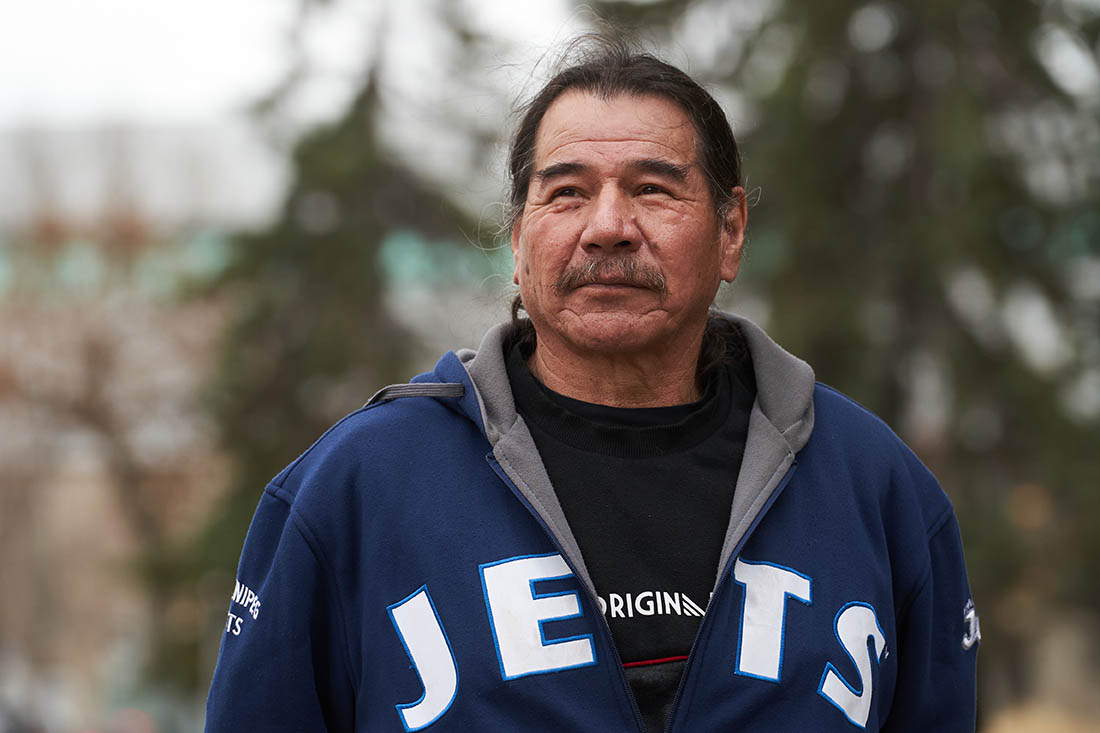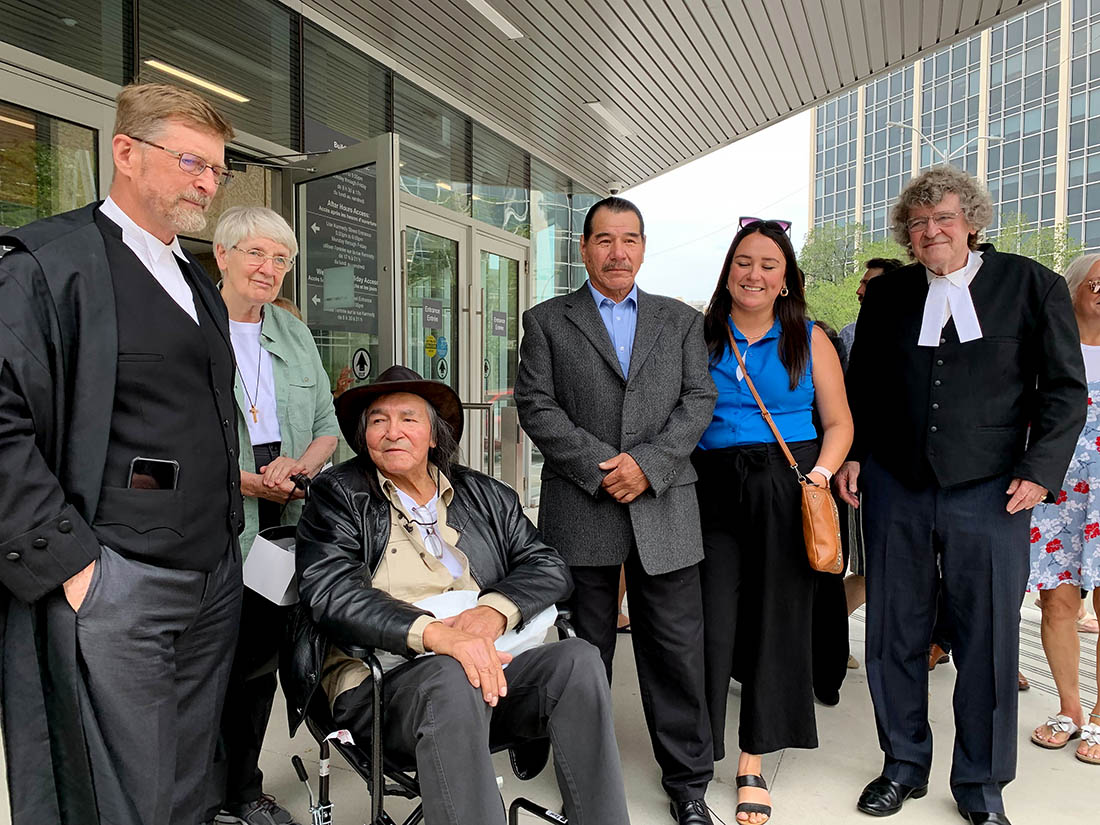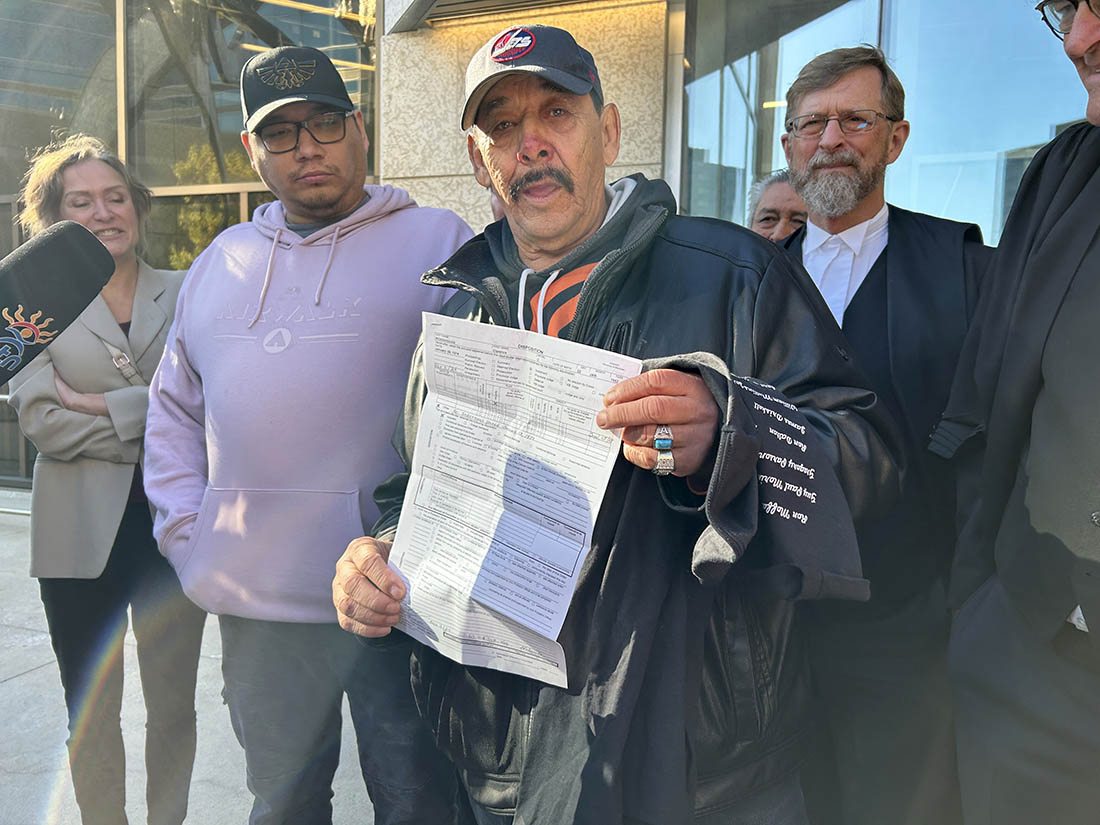In 1973, Winnipeg police charged four Indigenous men, one of them a minor, for the murder of Ting Fong Chan. In spite of there being no evidence linking them to the crime, the four were coerced into signing false confessions, resulting in their conviction and imprisonment. The case raised important issues of systemic racism in the Winnipeg Police Service and Manitoba’s judicial system.
The Murder
Ting Fong Chan, age 40, was a recent immigrant from China residing in Winnipeg. He was employed as a cook at the Beachcomber Restaurant in downtown Winnipeg. Just after midnight on 17 July 1973, after working the night shift, Chan left the restaurant to walk home. He did not arrive there. At 6:00 a.m., a passerby found his body near a construction site at the intersection of Isabel Street and McDermot Avenue, a 15 to 20 minute walk from the restaurant. An autopsy conducted that afternoon revealed numerous stab wounds as well as injuries from a blunt object to the head, neck, chest and abdomen. Chan had no alcohol or drugs in his system.
Homicide Investigation
Detectives from Winnipeg Police Service were assigned to the case. Information from witnesses who would prove to be unreliable led the investigators to 518 Bannantyne Avenue. The address, which was not the site of the murder, was the residence of several Indigenous persons. On 22 July, the police arrested Clarence Clifford Woodhouse, 21; his brother Russell James Woodhouse, 19; and Allan John “A.J.” Woodhouse (no relation), 17. All were Saulteaux (Ojibwe) from the Fairford First Nation Reserve (now called Pinaymootang First Nation), 240 kilometres northwest of Winnipeg (see also First Nations in Manitoba). The next day, the Woodhouse brothers’ cousin Brian Anderson, 18, was arrested at Fairford. Two other men were arrested and subsequently released for reasons unknown.
Confessions
Clarence Woodhouse, Russell Woodhouse, Allan Woodhouse and Brian Anderson, none of whom had any criminal record, were questioned by two teams of Winnipeg police officers; Detective Sergeants King and Murdoch, and Detective Sergeants Scott and Varey. Anderson was questioned without legal representation. The police did not investigate Anderson and Allan Woodhouse’s alibis, that they were home asleep at the time of the crime. Clarence and Russell Woodhouse were never asked for alibis. After interrogation, the suspects signed confessions, which the police said were in their own words and written down by the officers present.
Clarence and Russell Woodhouse, and Brian Anderson were charged with capital murder. Allan Woodhouse, legally classified a juvenile at the time, was charged with manslaughter.
Trial
The trial was held in Manitoba’s Queen’s Bench Court before Mr. Justice Wilson. It was concluded on 5 March 1974. The Crown prosecutor was George Dangerfield. Russell Woodhouse, though a youth at the time of his arrest, had been transferred to adult court. The judge and court officials, the lawyers, the police officers and the all-male jury were all White.
All four defendants denied having had anything to do with the murder. There was no forensic, circumstantial or eyewitness evidence connecting them to the crime. The prosecution’s case was based entirely on their confessions. However, the defendants testified that the confessions were false, that the police had coerced or tricked them into signing the documents. Clarence Woodhouse said he was intoxicated when he was arrested, and that he’d agreed to sign only after the detectives punched him, pulled out some of his hair and “fought him twice.” He recalled that when Allan Woodhouse was brought into the room he was in, Allan’s nose was bleeding. Brian Anderson said the police had taken his belongings from him and told him he had to sign a paper to get them back. He said he signed the paper without reading it, not realizing it was a confession. In a statement that seemed to support the claims of physical abuse by the officers, a Crown witness who was one of the men who’d been picked up by the police and then released, testified that Detectives King and Murdoch slapped him several times during questioning.
The first language for the four accused men was Saulteaux (see also Anishinaabemowin: Ojibwe Language). During the trial, it became clear that Clarence Woodhouse, and possible the other defendants, had limited English language skills. Clarence Woodhouse did not comprehend such words as “investigation”, “evidence” and “interview.” When it became apparent in court that his proficiency in English was rudimentary, an interpreter was provided. Counsel advised that this was the interpreter’s first time in a courtroom. As Innocence Canada indicated in their case for Clarence Woodhouse, the confessions police claimed the accused men made were in fluent English, as were subsequent answers to police questions that were reported by the investigators. A psychiatrist and a psychologist called by the defence testified that Russell Woodhouse had an intellectual disability and could not have given the narrative statement that was presented as his confession.
The jury and the judge did not believe the defendants’ claims of police brutality and the judge said that “although Russell is in the low-grade category, he is not retarded.”
Clarence Woodhouse, Allan Woodhouse and Brian Anderson were convicted of non-capital murder and sentenced to life imprisonment without parole eligibility for 10 years. Russell Woodhouse was found guilty of manslaughter and sentenced to 10 years imprisonment. George Dangerfield wrote a letter to the chief of the Winnipeg Police Service commending the “excellent work” of the detectives involved in the case.
All four convictions were appealed. George Dangerfield continued to represent the Crown in the Court of Appeal, and the appeals were denied. Brian Anderson applied for leave to appeal to the Supreme Court of Canada, but the application was dismissed.
Prison and Parole
The four convicted men were imprisoned. Russell Woodhouse was sentenced to 10 years in prison and was later released. He died on 21 May 2011. The other three men were later released on parole. Clarence Woodhouse’s parole was suspended on 17 February 2023. He was released on bail on 23 October 2023.
Innocence Canada
After release from prison, the convicted men still insisted they were innocent of the murder. Clarence Woodhouse, Allan Woodhouse and Brian Anderson had to live under parole conditions after their release from prison. In 2006, Brian Anderson contacted the Association in Defence of the Wrongly Convicted, which later become Innocence Canada. Innocence Canada’s stated mission is “to identify, advocate for and support the exoneration of individuals who have been convicted of a crime they did not commit.” However, it was not until 2018 that Innocence Canada began to work on the case. In January 2019, Innocence Canada filed a ministerial review application on Anderson’s behalf. A further application for Allan Woodhouse was filed in 2020.

Investigation by Innocence Canada revealed that the men had been victims of individual and systemic racism and had not received a fair trial. They had been coerced into signing false confessions by officers of a police department that had a catalogued history of racism. The police failed to investigate the men’s alibis and did not provide them with an interpreter.
The use of a derogatory word for Chinese people by the trial judge and George Dangerfield in reference to the murder victim, as well as condescension toward the accused men indicated a racist attitude. Innocence Canada also raised concerns over the fact that Dangerfield had been the prosecutor in four other high-profile murder cases in Manitoba in which convictions had been overturned. A First Nations Languages expert reviewed the confessions of the four men and expressed doubts as to their validity. The confession signed by Clarence Woodhouse said in part:
Me and my brother and Allan we were drinking down at Adam’s place. So we went out to get some beer … So we seen that guy … I think Allan ask him for money to ah buy a beer. So that guy he didn’t want to give it. So I took my knife and I stabbed him on his back. He was down and I stab him on his stomach … And on his neck, there. Well, so Russell was hit him on his head with a bar that was down on the street there. Allan, he jumped the guy. He stab him with his knife, down his neck. So we took off … Allan threw his knife away, a black one.
The expert indicated that Clarence Woodhouse’s confession did not have the grammatical indicators of his approach to speaking English, further challenging the validity of the confession.
Acquittal
As a result of the Innocence Canada report, the case received national attention and federal Justice Minister David Lametti ordered a new trial for Brian Anderson and Allan Woodhouse. On 18 July 2023, both were acquitted. On 3 October 2024, Clarence Woodhouse was also acquitted. The men received official apologies. The acquittals were acknowledged in a ministerial statement made by Minister of Justice and Attorney General Matt Wiebe in the Legislative Assembly of Manitoba on 3 October 2024.
On 13 September 2023, Innocence Canada filed an application for a ministerial review of Russell Woodhouse’s conviction. To date, it remains pending due to the unique situation of the client being deceased. At present, the murder of Ting Fong Chan remains unsolved.

 Share on Facebook
Share on Facebook Share on X
Share on X Share by Email
Share by Email Share on Google Classroom
Share on Google Classroom





